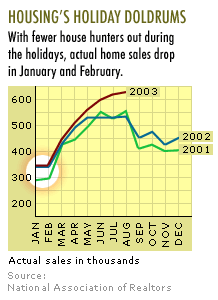BEND, Ore. (CNN/Money) – Year in and year out, the real estate market slows down significantly during and immediately following the holidays.
"The lowest actual sales numbers for the year are almost always in January or February," said Walt Molony, spokesman for the National Association of Realtors (NAR). "That's because these are the sales negotiated around the holidays."

Typically, the market begins slowing in late October, drops off drastically a week or two before Thanksgiving and doesn't start picking up again until after Super Bowl Sunday in late January.
"For the seller, this is usually the worst time to sell," said Ray Brown, co-author of "House Selling for Dummies" and other real estate books.
For buyers, however, there are great advantages for sticking with the home search even as the rest of the world heads to the mall.
Buyers get a break
Over the past couple of years, homebuyers in many parts of the country have come to accept hasty offers and bidding wars as par for the course in a competitive housing market.
The holidays may be a welcome reprieve from this cutthroat environment.
"It's a little less hectic [for buyers] during the holidays," said Molony. "You don't have to take shortcuts like forgoing an inspection, and you're less likely to get caught up in bidding wars."
Though there are fewer houses on the market this time of year, in most markets, this decline is still less than the decline in "competition." Nationally, the number of listings dropped 8 percent last December and 12 percent the year before.
"Buyers are in a really strong position," said Ron Phipps, a realtor in Providence, R.I. "Although the inventory of houses for sale is lighter, there is less competition with other buyers, and the sellers usually have a strong need to sell."
Lines at the mortgage bank also get shorter during the holidays.
"Financing may be somewhat faster because lenders aren't processing as many loans," said Brown. "You will get better service and more attention this time of year."
The same is generally true for home inspectors, appraisers, title companies and others involved in the transaction, he added.
But while the process is typically faster, buyers hoping to close before the end of the year (and claim related tax deductions on this year's return) should plan to do so before the last two weeks of the year, when the work weeks are cut short by holidays. "If you're shooting for a year-end close, it will be tricky," said Brown.
Not all bad news for sellers
There is no question that the holidays are not an ideal time to list your home. The number of active buyers declines, and so do your chances for getting top price.
Last year, actual sales between December and January fell 23 percent, according to NAR data, reflecting that fewer buyers were out shopping for a house in November and December. (It typically takes 30 to 60 days from the time an offer is made to the final sale.) The holiday dips have been even more drastic in years past. Between December 1999 and January 2000, for example, sales dropped 29 percent.
| More on Your Home
|

|
|
|
|
"A 'For Sale' sign in your yard during the holidays is like a 'kick me' sign," said Brown. "You are telling buyers you are a distressed seller."
If you have a choice, wait until February, when buyers have recovered from the hangover of the holidays, not to mention their Visa bills.
Of course, many sellers don't have the option of taking their home off the market. These sellers, said Phipps, should use the holidays to their advantage.
Tasteful holiday decorations, a roaring fire and the smell of baked goods can move buyers to overlook a home's flaws and imagine themselves living in a house.
"Houses really tend to look their best this time of year," said Phipps. "I encourage my sellers to capitalize on all the holiday trappings."
(Similarly, Phipps cautions buyers about getting too caught up in the moment and not doing their due diligence.)
Moreover, buyers during this time of year are just as serious about finding a house as sellers are about getting rid of theirs. Serious buyers are more likely to make serious offers, rather than throwing out a low-ball offer. They're also more likely to have started the process of getting financing.
"You don't get those people who are just looking for decorating ideas," said Phipps.

|

